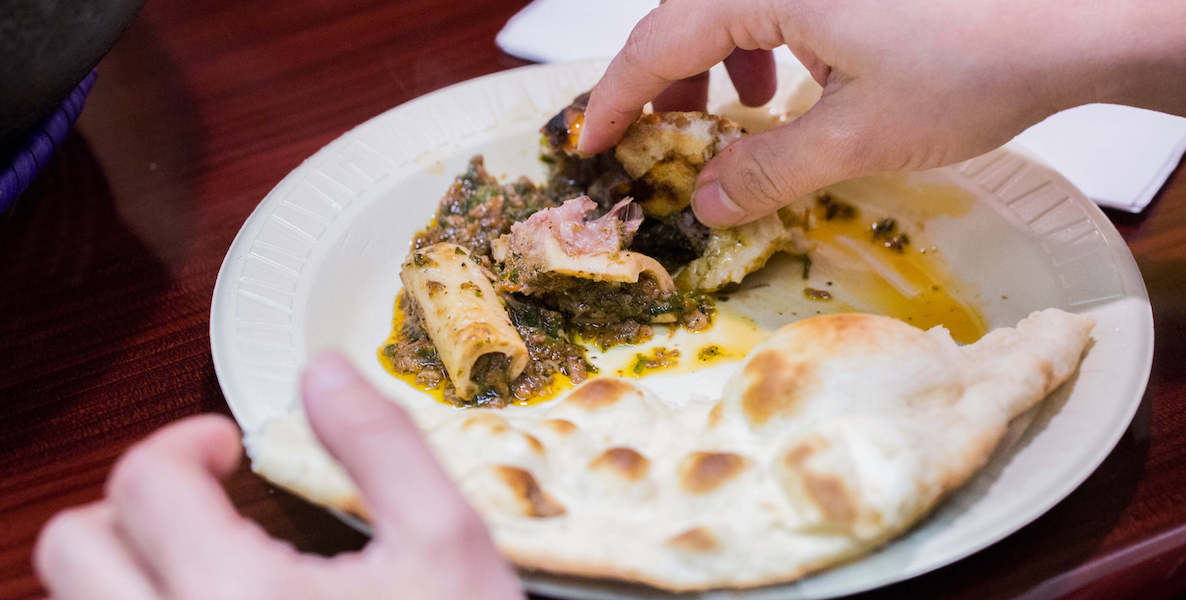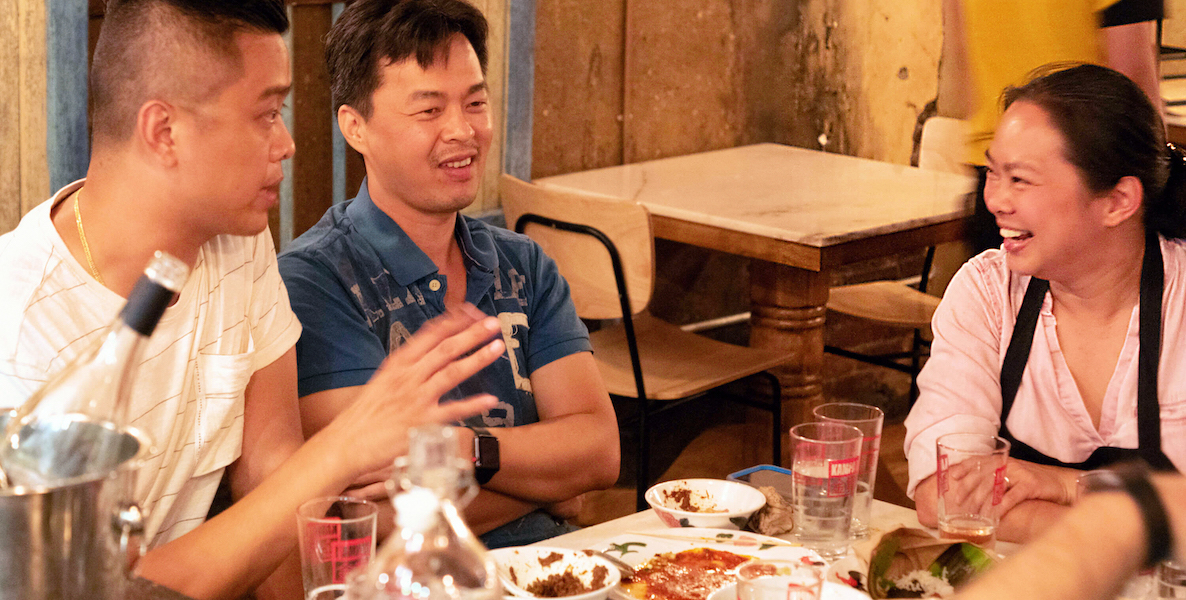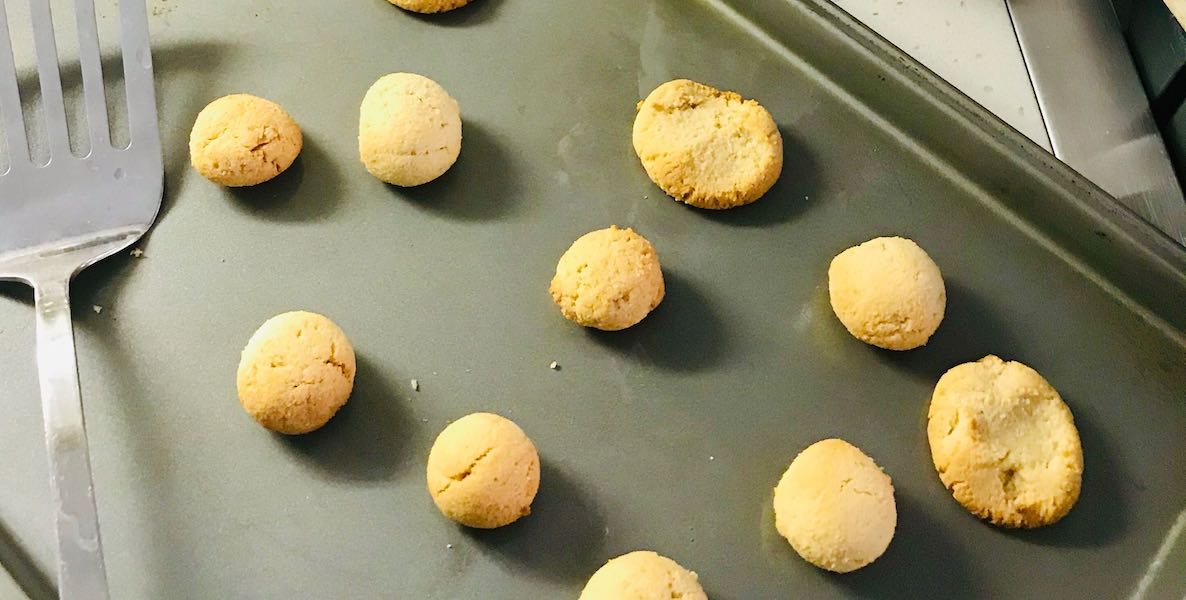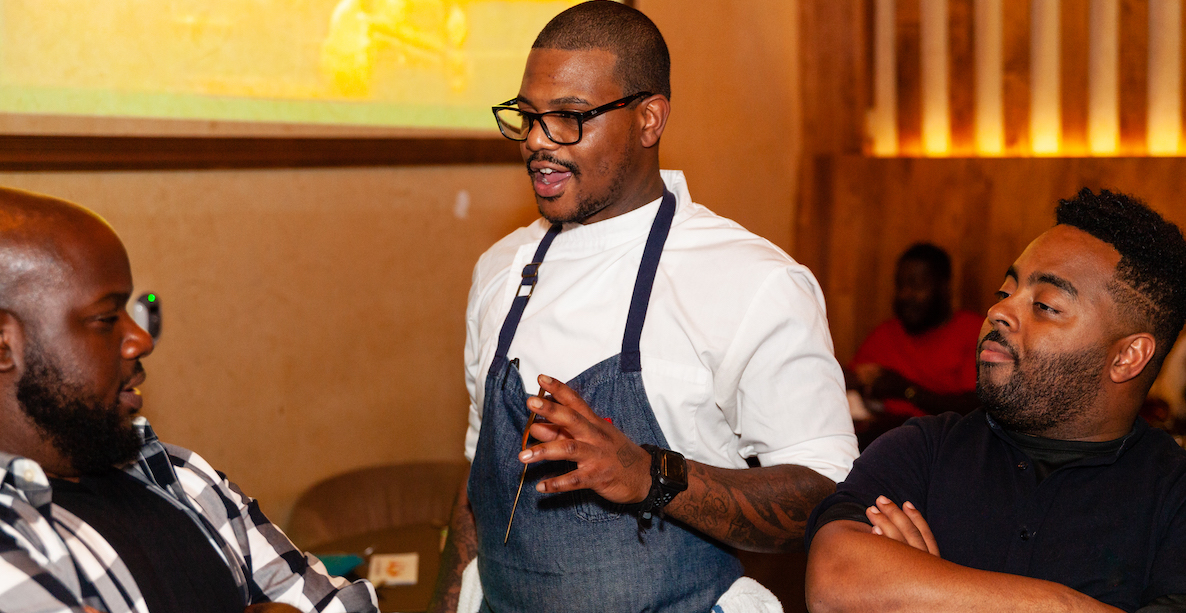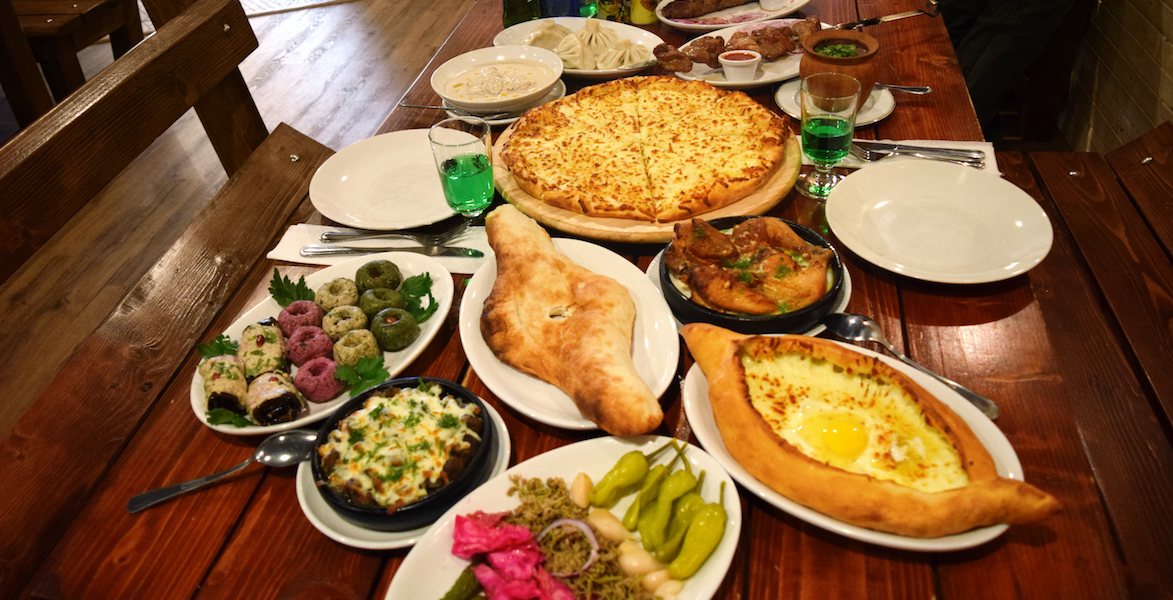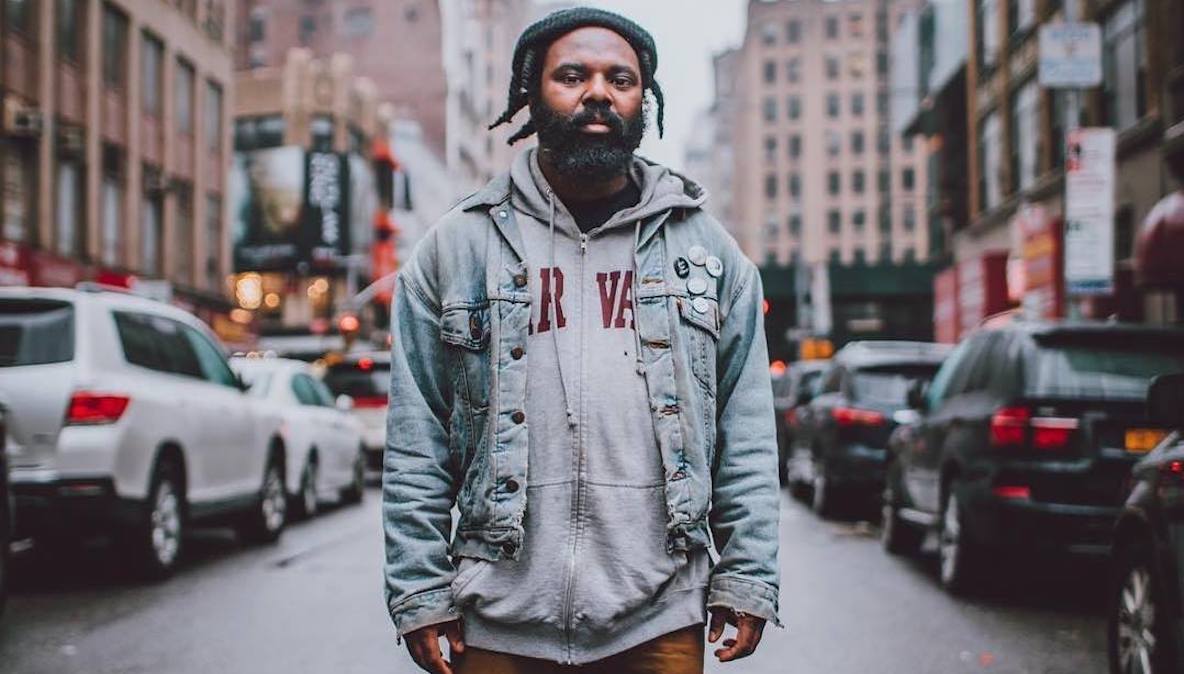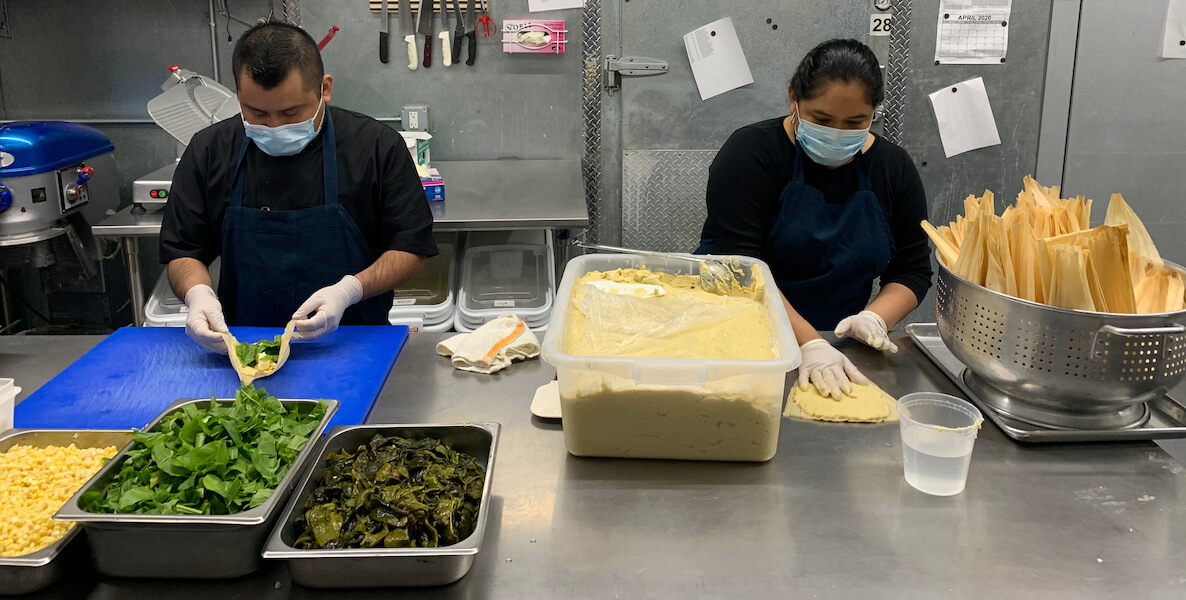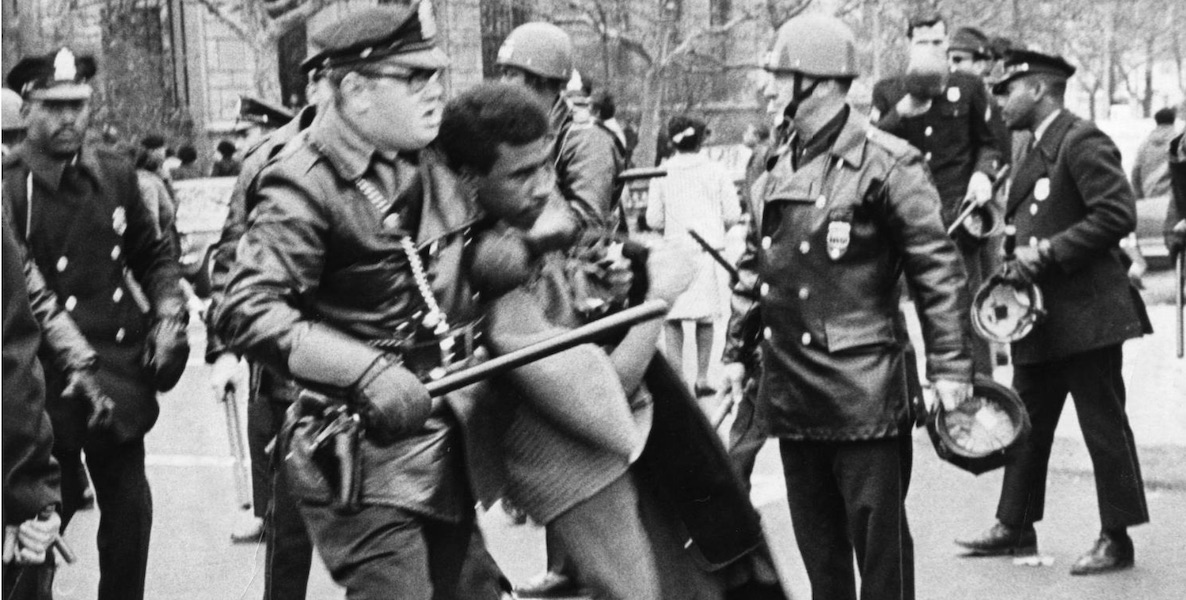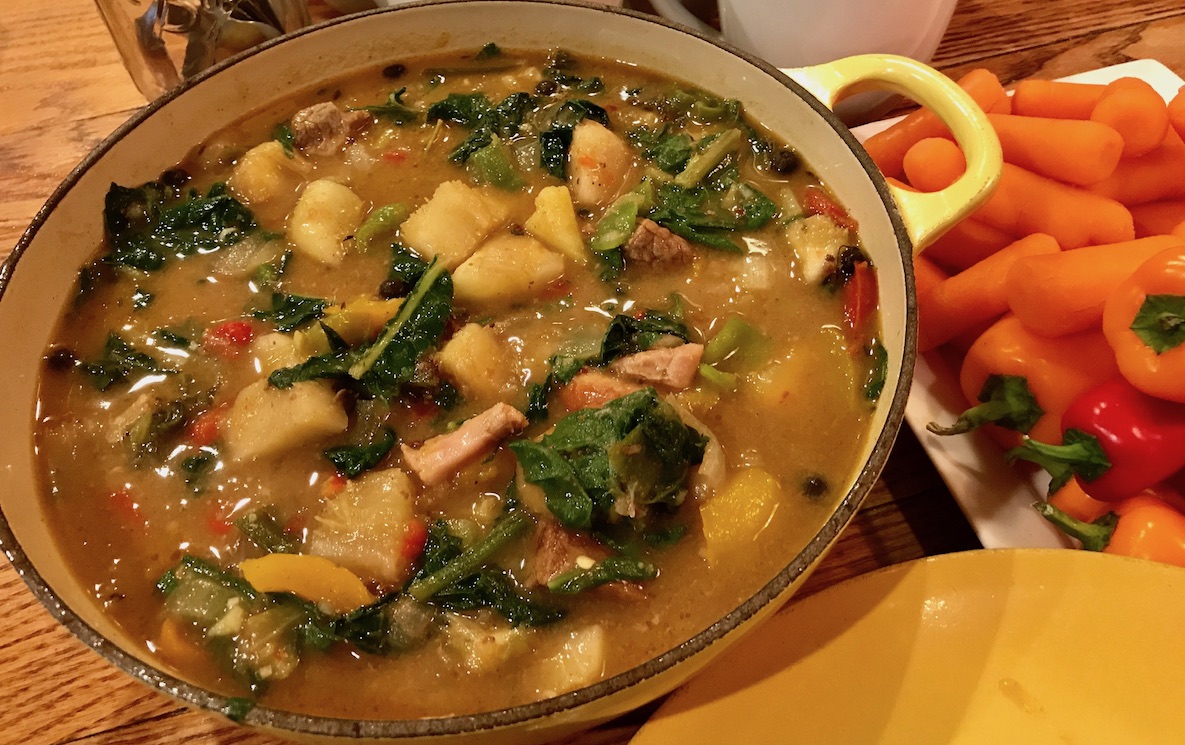![]() The dishes Omar Tate served for the takeout version of his renowned Honeysuckle pop-up, during a stint at South Philly Barbacoa back in April, were almost familiar.
The dishes Omar Tate served for the takeout version of his renowned Honeysuckle pop-up, during a stint at South Philly Barbacoa back in April, were almost familiar.
He offered, among other items, a set menu of battered fried chicken, salad studded with snow crab and edible flowers and honey pie made with Maryiza’s Ethiopian honey, which tastes the way flowers smell, only richer.
Tucked carefully into the package was a photocopy of a poem called “Rice (A Run-On Sentence)” written by Tate and printed in his small, precise handwriting. His ode to the humble grain was a clear indication that this was more than a meal.
![]() In the before times, Honeysuckle pop-up was a critically lauded immersive dining experience that Tate ran out of, among other locations, Tom Colicchio’s award-winning Craft Restaurant in Gramercy Park and a high-end loft in New York City. They were immersive experiences that brought together art, poetry and food to give diners a look inside Omar’s own life.
In the before times, Honeysuckle pop-up was a critically lauded immersive dining experience that Tate ran out of, among other locations, Tom Colicchio’s award-winning Craft Restaurant in Gramercy Park and a high-end loft in New York City. They were immersive experiences that brought together art, poetry and food to give diners a look inside Omar’s own life.
“I go back time after time because the food is delicious, but I also walk away feeling so inspired by his work and the completeness of the narrative he offers,” says Korsha Wilson, a nationally renowned food writer and host of the Hungry Society podcast, who attended many of Tate’s dinners in their original form. “I recommend everyone go to a Honeysuckle dinner, just to understand…I hesitate to say a perspective, because he’s so singular, but in that story there’s a lot that is familiar to other Black men’s stories and other Black chefs in America.”
“I wanted the people that I was talking about in my food and in my writing to enjoy the space as well, and that could only happen here, at home,” Tate says. “And so the mind-state flipped and turned to bringing downtown up here.”
After cooking at Center City restaurants Fork and Russet, Tate spent years in New York cooking professionally, giving up cooking professionally, and then returning to the kitchen to create Honeysuckle pop-up.
The takeout pop-ups he started at South Philly Barbacoa in early April, which sold out week after week, were phase one of Tate’s return to Philly (he grew up in Germantown). And he recently launched phase two: an ambitious crowdfunding campaign for the second iteration of Honeysuckle, hoping to raise $250,000 to purchase a space in the Mantua neighborhood of West Philadelphia, where Tate now lives.
Evolving the Vision
The business, which Tate is now calling simply Honeysuckle, will be a hybrid space—a grocery store, café, art gallery and community center all in one. Tate says Honeysuckle was always about more than food, but the idea has evolved.
“I was looking to get a place downtown in Philly,” Tate explained. “Because what I’ve been doing with Honeysuckle for all these years was situating Black culture as something that could be sold and commodified and respected and appreciated in the same market as like a Jean-Georges,” the high-end restaurant at top of the Four Seasons Hotel.
When the pandemic hit, it forced him to take a step back, and the vision evolved to focus on keeping the investment in his own community.
“I think I realized that if I situated it downtown, sure, I’d be able to say ‘Yeah, this Black culture deserves to sit beside like Le Bec Fin, or whatever,’” Tate explained, name-checking one of Philadelphia’s most storied restaurants, which closed in 2013. “But I wanted the people that I was talking about in my food and in my writing to enjoy the space as well, and that could only happen here, at home. And so the mind state flipped and turned to bringing downtown up here.”
Tate’s new vision includes mentorship and after-school programs, art classes and summer camps, in addition to the café and grocery store, mostly stocked with items produced by Black-owned businesses. And he’ll continue his pop-up dinners—which can run anywhere from $100 to $300—to offset some of the costs of other programs and draw in diners from across the city and region.
“I recommend everyone go to a Honeysuckle dinner, just to understand…I hesitate to say a perspective, because he’s so singular, but in that story there’s a lot that is familiar to other Black men’s stories and other Black chefs in America,” says Korsha Wilson.
Ultimately, he’d like for Honeysuckle to reach across Philadelphia and unite people who are otherwise separated. It’s a radical idea, to create a Black-owned community center in a low-income part of Philadelphia that will also serve as a cultural hub meant to draw attention from outside that community as well, but Tate is uniquely situated to pull it off.
A Personal Perspective
![]() “The thing that’s amazing about Omar’s food is that he’s not trying to speak for anyone,” says Korsha Wilson. “I think sometimes with Black chefs, the idea that they have to speak for an entire community is foisted upon them by people, by the food media, and Omar doesn’t say his food is universal. It’s very much him cooking, writing, drawing his way through what he’s experienced, and that allows everyone to approach it.”
“The thing that’s amazing about Omar’s food is that he’s not trying to speak for anyone,” says Korsha Wilson. “I think sometimes with Black chefs, the idea that they have to speak for an entire community is foisted upon them by people, by the food media, and Omar doesn’t say his food is universal. It’s very much him cooking, writing, drawing his way through what he’s experienced, and that allows everyone to approach it.”
“I have this ability to navigate between different circles,” he says. “I think [this concept] will bridge communities and have people care about each other across social divisions. If it is as groundbreaking as I’m planning, it will become a destination, so people from outside of the neighborhood will have to share a meal and understand each other more.”
It’s a new vision for a community center in a city that has deep divides around class and race. And it’s rooted in Tate’s own family history. His grandfather was a Vietnam War veteran who returned to Philadelphia and became a member of the Black Panther party, participating in political organizing efforts in the ’60s and ’70s.
Tate recently learned that his grandfather also helped found a community center in South Philadelphia in the 1970s, which was later shut down by Mayor Frank Rizzo. His connection to the history of racial injustice in Philadelphia comes through in his cooking.
“My favorite dish Omar ever made was inspired by the Philadelphia bombings,” says Wilson, referencing a dish Tate called “Smoked Turkey Necks in 1980’s Philadelphia” that told the story of the 1985 MOVE bombings.
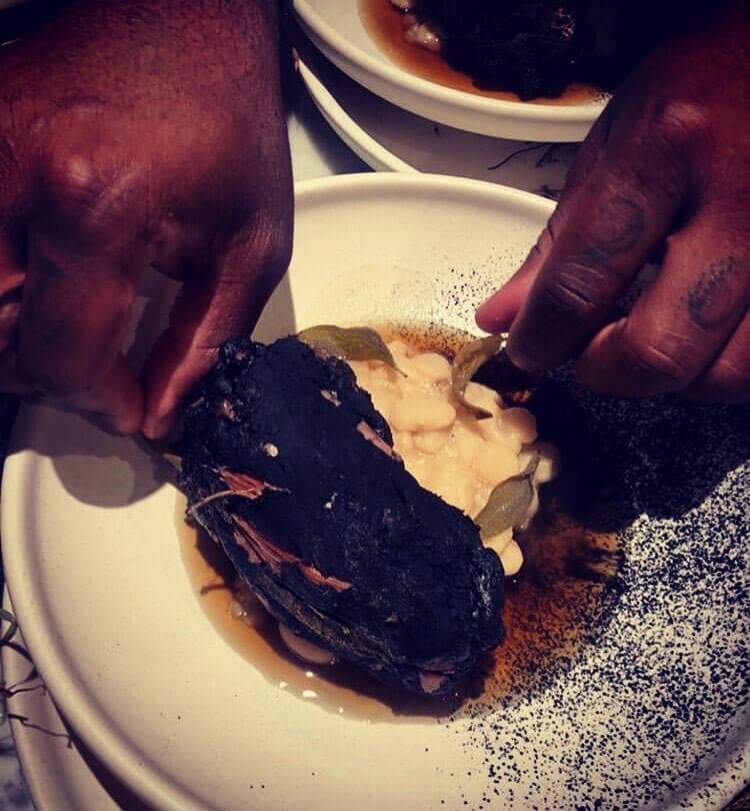
“It was so straightforward. There were no flowers, no foam, no superfluous garnish, and the char kind of got all over you, on your hands and teeth and clothes. I feel like that was intentional, like pushing you to not gloss over this event. It’s very much intentionally facing the ugly, ugly reality of being Black in this country. It was just this incredible, straightforward statement of how fucked up this country is to Black folks.”
“In this city, Black people don’t really own a whole lot of things, especially property,” Tate says. “I want to stake a claim in the neighborhood that I live in, to develop and claim ownership and be able to perpetuate this business through my family line.”
Leaning On Community Support
Though community-minded, Tate plans to operate Honeysuckle as a for-profit business. He has already raised $70,000, a good chunk of the $250,000 he plans to raise in order to purchase the space outright. Owning the space will give him leverage to build the business, a process that can be difficult in Philadelphia where there are fewer Black-owned businesses per Black resident than in Washington, Boston, New York or Atlanta.
Tate says Honeysuckle will create jobs and opportunity within Mantua, and draw in dollars from other more affluent neighborhoods when residents come spend their money.
“In this city, Black people don’t really own a whole lot of things, especially property,” Tate says. “I want to stake a claim in the neighborhood that I live in, to develop and claim ownership and be able to perpetuate this business through my family line.”
![]() To raise the money, Tate is leaning on community support through his GoFundMe, and on what he does best: making food that feeds the mind, body and spirit. Each person who donates more than $100 will receive a bean pie—a creamy pie flavored similarly to a sweet potato pie, but made with great northern beans.
To raise the money, Tate is leaning on community support through his GoFundMe, and on what he does best: making food that feeds the mind, body and spirit. Each person who donates more than $100 will receive a bean pie—a creamy pie flavored similarly to a sweet potato pie, but made with great northern beans.
The dessert has a history steeped in political organizing; it originated in the 1930s when Elijah Muhammad, the founder of the Nation of Islam, encouraged followers to reject classic soul food ingredients like sweet potatoes that connected Black people to slavery. To replace the sweet potato pie, the bean pie was created.
Tate grew up eating bean pies—his family was one of many Black families that converted to Islam through the Nation of Islam in the 70s and 80s. Like the takeout meal of salad, fried chicken and honey pie, the bean pies are one part comfort food, one part revolution, one part historic legacy and one part nourishment, a word Tate talks about a lot.
“It’s kind of like an energy transfer to me, to be nourished,” he says. “I want people to understand that what I’m doing is not just for your belly, it’s for your body, it’s for your mind, for your community.”
Honeysuckle pop-up founder Omar Tate


